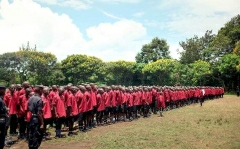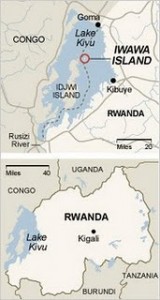Iwawa, the Island of Shame in Rwanda

Young adults and minors, arrested for petty crimes, on Iwawa Island
In an article published by New York Times on April 30 and titled Rwanda Pursues Dissenters and the Homeless, journalist Jeffrey Gettleman depicts the dire conditions in which live hundreds of minors and young adults arrested for petty crimes ranging from being homeless to not having an identification card. They are secretely sent and kept isolated on the island without the knowledge of their parents and relatives and without trial.
While the government claims that the island is a rehabilitation facility, many see it as nothing more than a prison camp where the country�s street kids, whom the government feels have tarnished the appearance of the country, are kept contained.
Here is what New York Times writes:
IWAWA ISLAND, Rwanda � A few months ago, Gasigwa Gakunzi was hanging around a ramshackle house where poor children pay to watch television when the Rwandan police arrested him for loitering. The next thing he knew, he said, he was taken away from his family and carted off to this remote island in the middle of Lake Kivu.
Gasigwa, 14, now spends his days learning patriotic songs and how to march like a soldier. At night, he sleeps in a huge sheet-metal shed with hundreds of men and boys packed mattress to mattress.
�Please call my father,� he whispered. �He has no idea where I am.�
Iwawa Prison Island
Nearly 900 beggars, homeless people and suspected petty thieves, including dozens of children, have recently been rounded up from the nation�s neatly swept streets and sent � without trial or a court appearance � to this little-known outpost. They will spend up to three years here being �rehabilitated,� learning skills like bricklaying, hairdressing and motorcycle maintenance.
It is one of the country�s newest self-improvement projects, and it seems a fitting symbol for what many political analysts and human rights groups say Rwanda has become: orderly but repressive.
Under President Paul Kagame, this country, which exploded in ethnic bloodshed 16 years ago, is now one of the safest, cleanest and least corrupt nations on the continent.
The capital, Kigali, is not ringed by sprawling slums, and carjackings � a deadly problem in many African cities � are virtually unheard of here.
The roads are smoothly paved; there is national health insurance; neighborhoods hold monthly cleanups; the computer network is among the best in the region; and the public fountains are full of water, not weeds.
All of this has been accomplished in one of the world�s poorest countries.No room for dissent
But while the nation continues to be praised as a darling of the foreign aid world and something of a central African utopia, it is increasingly intolerant of political dissent, or sometimes even dialogue, and bubbling with bottled-up tensions. Recent grenade attacks in Kigali and a shake-up in the army showed that even one of the cornerstones of the new Rwandan state � personal security � might be in danger.
�Kagame�s strategy for stability is a dangerous, long-term gamble,� said Kenneth Roth, executive director of Human Rights Watch. �By stymieing a political opposition, an independent press or a critical civil society � in short, by not allowing democratic institutions to form � Kagame is leaving people little to identify with but their ethnic group.�
With less than four months to go before national elections, few of the major opposition parties have been allowed to register. Some opposition supporters have been attacked inside government offices; others have been jailed. Several prominent government officials who recently broke ranks with Kagame defected to other African nations, saying they feared for their lives. The BBC local-language radio service was shut down for a time because the Rwandan government did not like the way it was talking about the genocide of 1994.
That dark period, when death squads from the Hutu majority massacred hundreds of thousands of minority Tutsis, as well as moderate Hutus, remains the touchiest subject of all. In the past three years, Rwandan officials have prosecuted more than 2,000 people, including political rivals, teachers and students, for espousing �genocide ideology� or �divisionism.�
Kagame and his disciplined military quickly restored order after the genocide, and this stability has been the foundation for Rwanda�s remarkable comeback. The foreign minister, Louise Mushikiwabo, says that after all Rwanda has been through, the government has to remain vigilant about ethnic divisions.
�Rwanda will not allow any politician, political party, any individual, to tamper with the reconciliation and unity in Rwanda,� she said in an interview.
Instigators of violence have been prosecuted for divisionism, but so have people trying to discuss the country�s past or its current direction. Critics contend that the government wields Orwellian-sounding laws that are intentionally vague to stifle any inkling of opposition.
Even programs like the one on Iwawa Island, which the government says will give street people a second chance, are not exactly what they seem.
As a boatload of officials recently glided onto shore, one police commissioner gestured to the birds, the trees and the young men with uniformly shaved heads fetching water and said, �Welcome to our Hawaii.�
But on the mainland, people describe it as an Alcatraz.
�We call it the island of no return,� said Esperance Uwizeyimana, a homeless mother of four.
None of the vocational training programs had started by mid-March. Protais Mitali, the youth minister, insisted there were no street children here, just adults. Yet squeezed in with the men were many adolescents like Gasigwa, and employees confided that several dozen boys were incarcerated.
�This isn�t a good place for children,� one employee said in hushed tones because the minister was nearby. �They could get abused.�
Source: Jeffrey Gettleman / New York Times News Service
Watch the video on Rwanda’s Island Prison
Related:
- If you want to receive Rwandinfo articles in English through your RSS Reader, click here.


3 comments
[...] by The New York Times article (see Iwawa, the Island of Shame in Rwanda which revealed the shameful existence of the Iwawa island children’s prison camp, named the [...]
[...] from Rwanda where he was able to uncover the sinister Rwandan Island of Shame, New York Times’ Journalist Jeffrey Gettleman concludes his report on Rwanda with the [...]
[...] people in concentration camp at Iwawa Island and their [...]
Leave a Comment